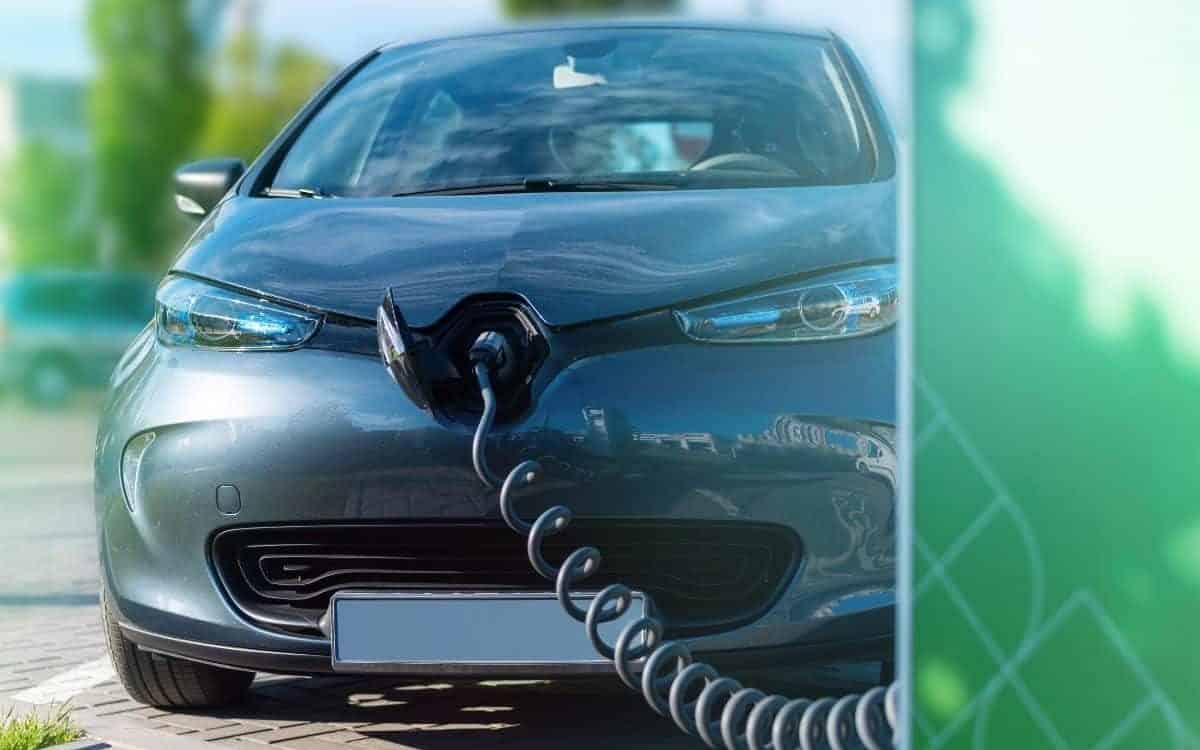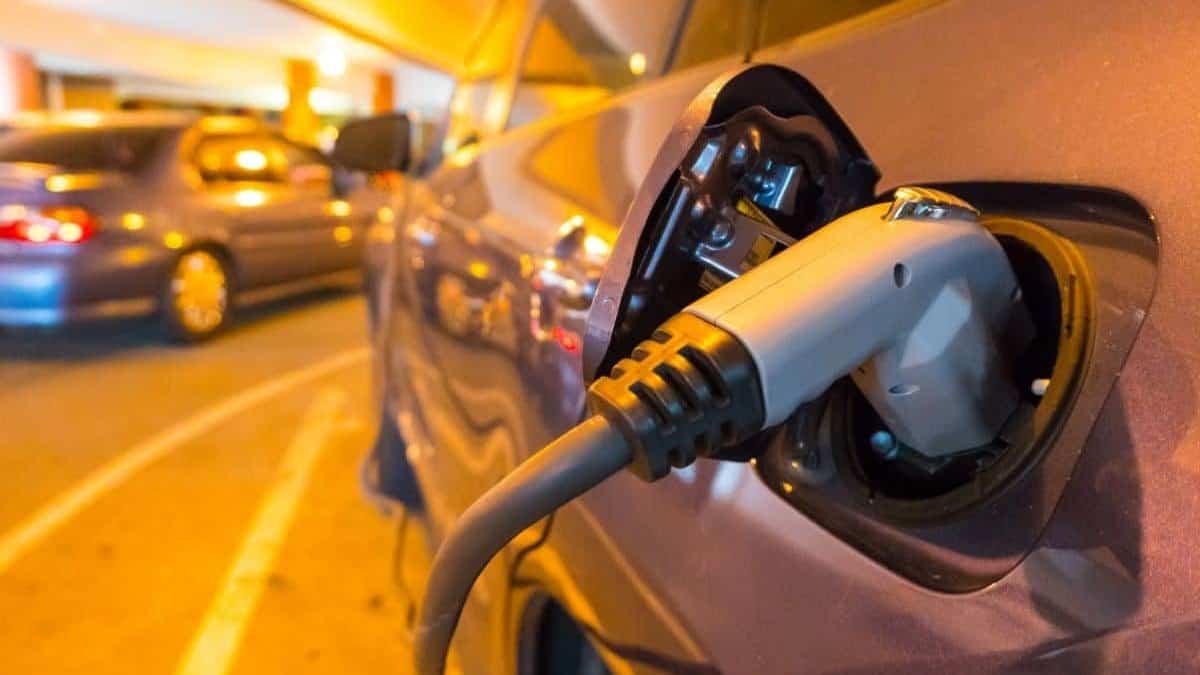EV stands for Electric Vehicle. And you can consider this article to be your beginner’s guide to all things EV in which I answer your most commonly asked questions.

What Exactly Is An EV?
As I mentioned earlier, EV stands for Electric Vehicle. And to elaborate on that, an EV is any vehicle that uses electric motors to move.
EVs are different to conventional motor cars, because regular cars use an internal combustion engine as their motor, whereas most EVs can rely on electricity as their power source.
Vehicles that can use both an internal combustion engine and a battery system are typically referred to as hybrids, or HEV, which stands for hybrid electric vehicle.
What Types Of EV Are Out There?
There are several different types of EV out there. Let me walk you through.
- A BEV is a battery EV. It’s powered solely by an electric battery, and has no gas engine.
- A HEV, as we touched upon earlier, is a hybrid. It uses an electric motor to assist a gas-powered engine.
- A PHEV is like a hybrid, but with a larger battery and larger electric motor.
- An FCEV is a fuel cell electric vehicle, and it uses hydrogen fuel cells to produce energy.
- An EV SUV is an SUV (sport utility vehicle) that has an electric motor. Unlike a traditional vehicle such as a car, an SUV has off-road features.
There are also rail-borne EVs, airborne EVs and seaborne EVs.
What Car Manufacturers Make EVs?
The brand that holds the biggest market share of EVs is Tesla Motors. And when EVs first started becoming popular, EVs were synonymous with Teslas.
However, time has gone on since then, and a great many other car manufacturers have started making both regular EVs and hybrids.
Back in 2018, there were a whopping 20 different electric car manufacturers, and it is expected that more will follow suit.
Here’s a quick list of some of my favorites for you (in no particular order):
- Tesla
- Nissan
- Ford
- Kia
- BMW
- Chevrolet
- Volkswagen
- Toyota
- BYD
- General Motors
This is not a full list, and if you don’t see your favorite brand on here, that’s not to say that they haven’t started making EVs and hybrids. I have several articles on this website about whether certain brands make EVs and hybrids, including Subaru, Acura, Hyundai, Infiniti, And Mercedes.

Brief History Of EVs
You know, it turns out that Tesla Motors were not actually the first manufacturers of electric vehicles. The electric motor was invented in the 1800s, and the first mass-produced electric vehicles appeared in America in the early 1900s.
EVs didn’t really take off at the time, however, due to how much cheaper it was to make an assembly line for gasoline vehicles, so they dominated the market instead. But in the meantime, inventors continued to experiment with different technologies.
In the late 20th and early 21st century, concern naturally increased about the impact of these gasoline cars on the environment, including both air pollution and climate change.
For this reason, there’s been a recent resurgence in the production of EVs, backed by government incentives to increase their use in the late 2000s including in the USA and in Europe.
Brief Summary Of How An EV Works
An EV has a lot in common with a traditional car in terms of things like the wheels, the tires, the steering, the brakes, and the suspension system.
The biggest difference lies in how they are powered. Whereas a traditional car has an internal combustion engine that requires gas to fuel it, an EV instead uses a battery, usually a lithium-ion battery, to power it. Instead of requiring fuel, you power these batteries by re-charging them.
Current electric vehicles can travel up to about 250 miles on a full charge, and they can take anywhere between 30 minutes and 12 hours to charge, depending on different factors.
You can charge your EV at home, or you can charge it in one of the 46,000 public EV charging stations in the U.S.
EVs are much more energy efficient than their convention gasoline counterparts. EVs convert over 59 to 62 percent of their energy directly to the wheels of the car, whereas a regular car converts only 17 to 21 percent. That’s a substantial difference.
Relevant Articles You Might Like
Here’s a list of other articles on the website you may be interested in if you’d like to learn a little more about EVs:
- Why Are Electric Cars So Expensive?
- Why Should I Get An Electric Car?
- Are Electric Vehicles The Future?
- What Maintenance Does An Electric Car Need?
Wrap Up
We have mentioned this earlier, but it bears repeating here, EV stands for Electric Vehicle. Or, in other words, any vehicle that uses electric motors to move.
Although having EVs on the road may still feel new, the technology started being developed as far back as the 1800s.
But, due to the environmental issues caused by gasoline powered vehicles, several governments across the globe have put incentives in place which have led to a resurgence in the production and sales of electric vehicles.
And although Tesla remains the manufacturer of EVs with the biggest market share, there are more and more car manufacturers producing EVs and hybrid vehicles.
What’s more, although the average cost of an EV is still rather high compared to that of a conventional car, it is now possible to buy an EV for a much more affordable cost, if you go for the right brand.
Moreover, with more charging stations being created, driving an EV is becoming increasingly more practical.
So, if you like the sound of an EV, owning one could soon be in your sights!
- Tesla Charger Installation Cost (Home Setups) - March 1, 2024
- Tesla Phone Key Disconnected (Troubleshooting Guide and Quick Fixes) - March 1, 2024
- Tesla FSD 12 (Explained) - March 1, 2024